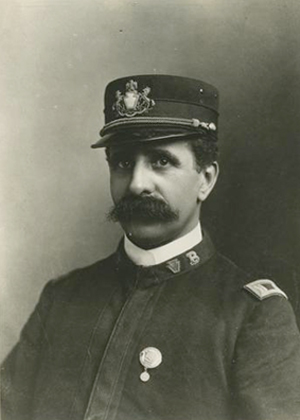 Captain Alfred Epher (Ephraim) Hunt, was born in East Douglas, Massachusetts, March 31, 1855. His grandfather, Oliver Hunt, and Uncle Joseph, blacksmiths, established the Hunt Axe and Edge Tool Works at East Douglas in 1795. As a young boy, Alfred watched as the blacksmiths turned a block of iron into an axe head. It was there, at the Douglas Axe Manufacturing Company, that young Alfred developed an interest in metals.
Captain Alfred Epher (Ephraim) Hunt, was born in East Douglas, Massachusetts, March 31, 1855. His grandfather, Oliver Hunt, and Uncle Joseph, blacksmiths, established the Hunt Axe and Edge Tool Works at East Douglas in 1795. As a young boy, Alfred watched as the blacksmiths turned a block of iron into an axe head. It was there, at the Douglas Axe Manufacturing Company, that young Alfred developed an interest in metals.
He graduated from Massachusetts Institute of Technology in 1876 with a degree in Metallurgy and Mining. During the latter part of his senior year he busied himself during the afternoons with analytical and metallurgical work for the Bay State Steel Company of South Boston, and continued with them for some time afterward, assisting in the erection of the second open hearth steel plant in the United States. In 1877, Alfred went to the Nashua Iron and Steel Company as a metallurgist and was put in charge of the chemical and metallurgical work in the open hearth department.
On October 29, 1878, Alfred married Maria T. McQuesten. Captain and Mrs. Hunt were the parents of one son, Roy Arthur, born August 3, 1881.
In 1881, the family moved to Pittsburgh where Alfred had taken a position at Park, Brother & Company, a steel-making concern. In 1883, Alfred resigned from the company, and together with George H. Clapp established an independent laboratory and consulting business. They began working for Pittsburgh Testing Laboratory, a pioneer in the analysis and mechanical testing of steel, and in 1887 acquired it. It was there that they recognized the merits of a new and inexpensive process being developed by Charles Martin Hall to separate aluminum from its oxide. They purchased Hall’s patents and organized the Pittsburgh Reduction Company.
The business later became known as the Aluminum Company of America (Alcoa), but not before Alfred’s untimely death in April of 1899. He died of complications from malaria, which he had contracted the year before in Puerto Rico while serving as a Captain in the Cavalry during the Spanish-American War.
About fifteen years before his death he organized in Pittsburgh Battery B, Pennsylvania National Guard, enrolling first as a private and soon being elected captain. Battery B was the first to offer its services to the United States in the Spanish-American War.
In The Technology Review, Vol. I, No. 3, 1899, John R. Freeman wrote:
“Captain Hunt will be long remembered as the leading personality in the development of the aluminum industry, but his whole professional life had been active, broad, and useful to an unusual degree … Under Captain Hunt’s earnest and aggressive management the business became highly prosperous, a corps of fifty or more chemists, metallurgists, inspectors, and assistant engineers being at times employed.
Notwithstanding the demands of business on his time and vitality, Captain Hunt always retained the most lively interest in technology affairs … Few men had so wide a circle of acquaintances and friends, and it is as a friend and for his rare personal qualities that the loss of Captain Hunt was widely felt. Never too busy for a quiet joke or a hearty laugh, with no bitterness or malice toward those who had crossed his path in business, a joyous good nature was the safety-valve that relieved the high pressure at which he worked.”
Images courtesy of The Hunt Institute
Roy A. Hunt | Rachel M.M. Hunt | Alfred E. Hunt